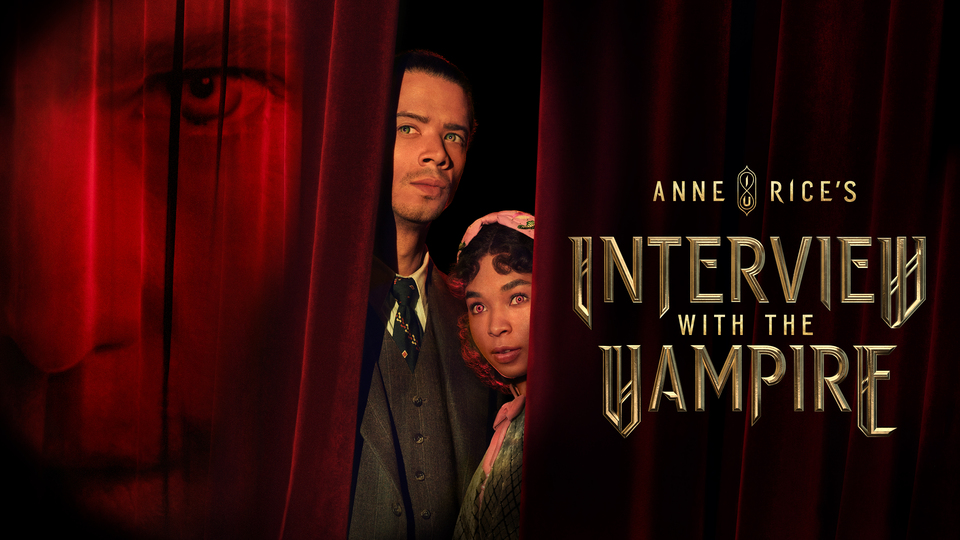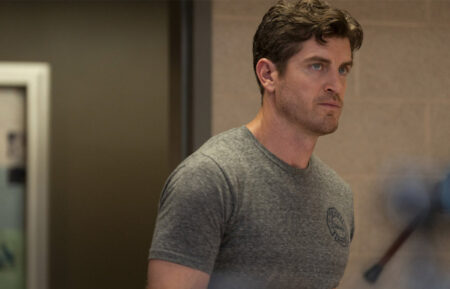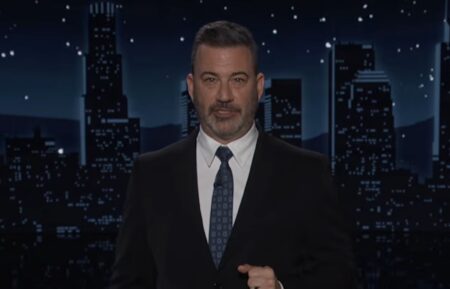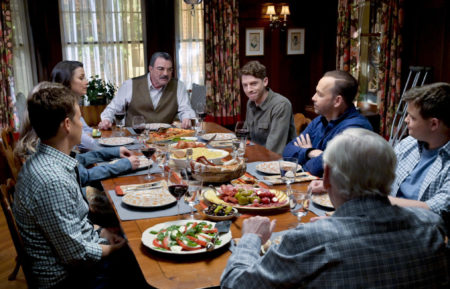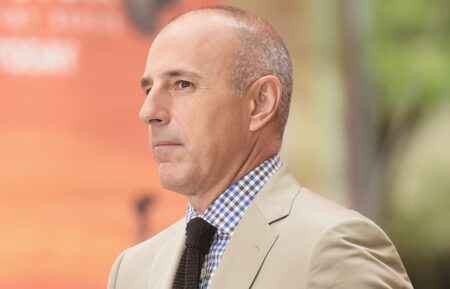‘Interview With the Vampire’: Jacob Anderson Unpacks the Gothic Horror of Season 2 (VIDEO)
With shows such as Mad Men, Breaking Bad, and Better Call Saul under its belt, AMC has made itself a network where creatives can bring their vision to life as they see fit. Interview With the Vampire is a shining addition to this category of art made for the sake of making it (it also has Breaking Bad and Better Call Saul‘s Mark Johnson as executive producer). The Southern Gothic drama is a reminder of how good it feels to see the unimpeded artistic process given first priority. And Jacob Anderson‘s commanding performance as the titular vampire is one of the main draws. The Game of Thrones alum takes a deep dive into Interview With the Vampire Season 2 in the video interview above ahead of the start of Emmy nominations voting.
Put aside all genre bias and consider the human story at the core of this tale. Based on the iconic 1976 Anne Rice novel, the book that popularized the humanized vampire in modern pop culture, Interview With the Vampire Season 2 sees Louis de Pointe du Lac (Anderson) continuing the excavation of his memories in his interview with investigative journalist Daniel Molloy (Eric Bogosian). After discovering he had repressed the truth about a painful memory from the end of his time in New Orleans in the Season 1 finale, Louis is determined to resurface anything else he may have been burying for decades in the second installment. It’s an exhaustive psychological marathon of not only examining your thoughts but why you think that way. Simply put, it’s therapy. But it’s therapy in a gothic horror setting, so the exhumed memories and existential questions they raise are dark and confronting. And the way this series — helmed by playwright Rolin Jones — navigates this darkness has made Interview With the Vampire one of TV’s top-rated dramas since its 2022 debut.
Vampirism is a perfect fictional framework for the exploration of a mind. It serves as a metaphor for how time passes but trauma still festers if left unaddressed. Time may heal all physical wounds, but the psychological toll remains, and those we love most often suffer the consequences of our failures to evolve. In this story, there’s the added threat of someone with the power to alter your memories entirely, blocking your ability to move on even if you wanted to. But as Anderson describes, Louis is on a personal journey of contrition on top of his search for the truth about why his vampire daughter, Claudia (Bailey Bass in Season 1, Delainey Hayles in Season 2), was murdered.
“All of it is the aftermath of her death,” Anderson tells TV Insider. “All of it in Dubai, everything in the present, she’s echoing through it.”
The only evidence of Claudia’s POV are her extensive diaries tracking her too-short immortal life. It was in these pages that she chronicled the inner turmoil of being turned into a vampire at age 14 with no say in the matter by her vampire fathers, Louis and Lestat (Sam Reid). Through her diaries, Louis learns in detail exactly how he failed his child throughout her upbringing. He grapples with this while simultaneously trying to decipher a nagging feeling that there’s something he doesn’t know about the day she was killed.
“That’s the hardest part of it really, for Louis, is to learn who he was through Claudia,” Anderson says. “He read those diaries when he was in a very different place and probably in the grips of a sort of hubris, like, ‘They took her from me. I’ve been wronged.’ And now, throughout Season 2, he’s in a state of, ‘Hang on, this was me. I did this. I wronged her. I hurt one third of my heart.’”

(L-R) Delainey Hayles, Eric Bogosian, Assad Zaman, Sam Reid, and Jacob Anderson (Maarten de Boer)
Louis betrayed Claudia when refusing to fully kill Lestat by burning his body in the Season 1 finale, driving a wedge between the two as they searched for more vampires in the second season. They finally found a horde of them in post-World War II Paris, but the Théâtres des Vampires coven — founded by Lestat and Armand (Assad Zaman) centuries prior — brought death to their family just as they did to the human patrons of their rundown theater. The coven (led by Ben Daniels, who is wickedly delicious as the evil Santiago) wanted Louis and Claudia dead, and they used their attempted murder of Lestat as the excuse to kill them.
Louis was saved from burning in the coven’s sham trial but was instead buried alive in a coffin full of rocks and kept in the walls of the theater’s basement to starve to death. Claudia and her lover, Madeleine (Roxane Duran), were turned to dust in the afternoon sun above him. Lestat was the trial’s prime witness, but the willingness of his participation in this deadly production is up for debate (and will likely be addressed in Season 3, which starts filming this summer and will debut in 2026). The Season 2 finale revealed the bombshell that it was Lestat who saved Louis in the trial, not Armand, the supposed second love of Louis’ life. Louis and Armand’s entire romance after Paris is based on this “seismic lie,” as Daniel called it, a lie that Armand took great pains to conceal for nearly 80 years.
Anderson has the hardest job of any lead actor on TV. He’s tasked with creating two different characters: the Louis we see in flashbacks, who’s feeling all of the initial impact of the defining moments of his life, and 2022 Dubai Louis, who is only just starting to process a lifetime of hardships. Both timelines are relentless with Louis’ emotional demands. Guilt, shame, fear, betrayal, and most of all grief are the spaces Anderson must constantly occupy, and he gets no breaks. Brief moments of contentment and bliss are intercut throughout this devastating “odyssey of recollection” in every single episode. Despite playing supernatural creatures, there’s very little high-intensity action in this series. The show is more interested in upturning every stone of the twisted minds of its deeply complicated characters. Pair that with deliciously poetic writing that attempts to meet the level of Rice’s descriptive prose, and you have a theatrical feast in which an actor can luxuriate. And Anderson does that in spades.
Playing Louis requires Anderson to hold space for contradictory thoughts and feelings at all times. Louis fears that Lestat could have survived the murder attempt, and he fears that he could really be dead. He’s terrified that Lestat will want revenge against him and Claudia, and he’s terrified that he’ll never see him again. He fears him, and he loves him. These are deeply complicated things to hold for someone who once physically abused you. The writers aren’t interested in delivering a moral judgment on the existence of these conflicting truths; they’re intrigued by asking what they make someone do and why. What is it like to have to occupy that headspace for months on end during filming?
“It’s what is so fun about working on this show,” Anderson shares. “You are asked to hold 10 things in your mind at once, plus this beautiful writing that you don’t want to f**k up. It’s really challenging, but to be completely honest, that’s sort of what my brain is like anyway. I do have a million things in my brain constantly going, and somehow working on this show helps me to focus it into Louis. I can just think about him and think about what he’s holding. In some ways it’s the most difficult thing and the most calming and cathartic thing about working on the show.”
The hardest part of playing Louis these past two seasons has been “everything about Claudia,” Anderson admits. “I really fell in love with Delainey, and so seeing her Claudia going through what she went through, I just found it really difficult. And I’m a parent. That also comes into it.” The final scene of Season 2, when Louis sends a telepathic message to the vampires around the world who are enraged by the publication of Daniel’s memoir and its outing of the vampire existence, was “the hardest scene in the whole two seasons,” Anderson reveals.
“I didn’t get through that many of those takes,” Anderson says of the finale’s powerful closing shot that’s just a closeup of his face. It serves as a bookend for Louis’ version of events and a direct parallel to his very first shot of the series. View the frames side by side and you see two completely different people. This “I own the night” moment couldn’t be a threat of violence, Anderson says.
“Louis has found such a level of peace and has reconnected with Paul [Louis’ late brother] and with Claudia and has taken accountability. I just did not want that moment to be violent,” Anderson explains. “I didn’t want it to be about Louis becoming a badass. It had to be about him for the first time in his existence, accepting himself. And I found that really emotional.”
It will be a wonder to see how this new Louis will manifest in Interview With the Vampire Season 3.
Interview With the Vampire, Seasons 1 & 2 Available Now, AMC+, Season 3 Premiere, 2026, AMC


